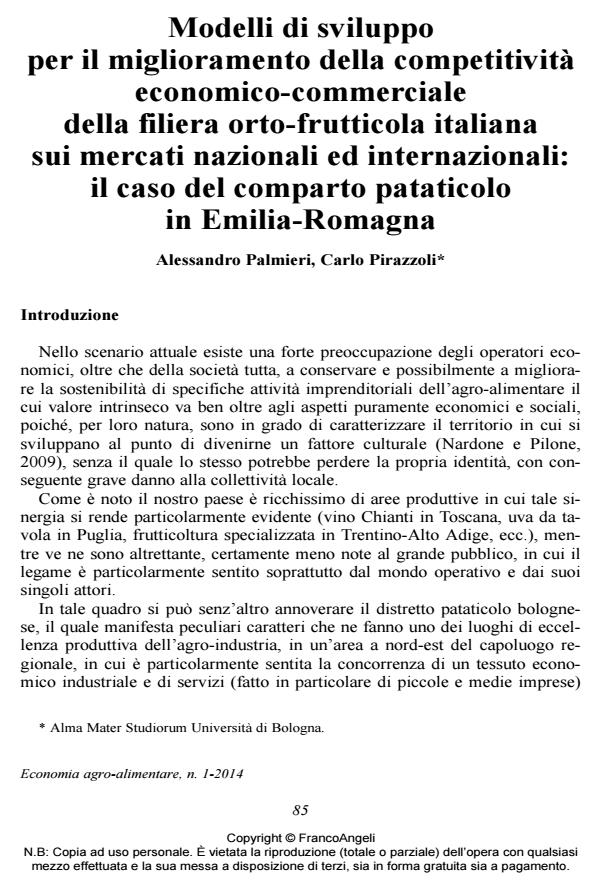Development models for the improvement of economic and commercial competitiveness of the Italian fruit and vegetable sector in national and international markets: the case of potato industry in Emilia-Romagna
Journal title ECONOMIA AGRO-ALIMENTARE
Author/s Alessandro Palmieri, Carlo Pirazzoli
Publishing Year 2014 Issue 2014/1
Language Italian Pages 32 P. 85-116 File size 309 KB
DOI 10.3280/ECAG2014-001005
DOI is like a bar code for intellectual property: to have more infomation
click here
Below, you can see the article first page
If you want to buy this article in PDF format, you can do it, following the instructions to buy download credits

FrancoAngeli is member of Publishers International Linking Association, Inc (PILA), a not-for-profit association which run the CrossRef service enabling links to and from online scholarly content.
The Italian fruit and vegetable supply chain has been in a critical situation for several years. In recent times this situation has been getting even worse, mainly on account of the general economic crisis, which has triggered strong price competition among the great retail chains, resulting in a fall in prices at farm level. In this situation, the potato supply chain has become one of the weakest among the fruit and vegetables sectors in Italy. Both at farm and processing-industry level Italy has several characteristics that make it virtually impossible to compete with large producers in central and northern Europe. Consequently, the potato supply chain has been continually forced to innovate and make sustained efforts to valorise and differentiate its product from the largely mass produced one that is offered in Europe. This paper focuses on a locality in the province of Bologna that is one of the most important in the potato sector in Italy. Its aim is to analyse the supply chain and identify ways to turn round the present situation, which has very narrow margins and is unsustainable in the long term. More particularly, the study shows empirically that an increase in the level of integration between the actors in the supply chain is absolutely essential. This includes both horizontal integration, by concentrating supply among the producer organizations, and vertical integration, by extending the contractual arrangements between producers and traders right up to the final link in the chain, the mass distribution retailers. Another type of horizontal integration the study suggests is so-called "organized direct selling", showing how this emerging form of selling can be more suitable for a vegetable such as the potato, than other forms of direct selling (farm selling, farmers’ markets, etc.).
Keywords: Potatoes, supply chain, integration, organized direct selling
Jel codes: Q11, Q12, Q13
- Galisai, T., Olmeo, G., & Usai, G. (2009). I farmers’ market: aspetti normativi e caratterizzazione dei consumatori. Agriregionieuropa, 5(18), 70-72.
- Hinrichs, C.C. (2000). Embeddedness and local food systems: notes on two types of direct agricultural market. Journal of rural studies, 16(2), 295-303.
- Houghton, J.R., Rowe, G., Frewer, L.J., Kleef, E.V., Chryssochoidis, G., Kehagia, O., & Strada, A. (2008). The quality of food risk management in Europe: Perspectives and priorities. Food Policy, 33(1), 13-26. DOI: 10.1016/j.foodpol.2007.05.001
- Kirwan, J. (2004). Alternative Strategies in the UK Agro-Food System: Interrogating the Alterity of Farmers’ Markets. Sociologia Ruralis, 44(4), 395-415. DOI: 10.1111/j.1467-9523.2004.00283.x
- Lugli, G. (1999). Valorizzazione del prodotto ortofrutticolo attraverso la marca e l’ottimizzazione dei rapporti di filiera (pp. 9-36). Presented at the Rapporti di filiera nel sistema ortofrutticolo italiano, Verona.
- Nardone, G., & Pilone, V. (2009). Organizzazione, innovazione e competitività nel sistema agro-alimentare: aspetti teorici ed implicazioni strategiche. Economia agro-alimentare, 11(2), 7-39. DOI: 10.3280/ECAG2009-002002
- Palmieri, A. (2006). Pataticoltura remunerativa solo se di qualità e organizzata. L’informatore agrario, 62(44), 40-44.
- Palmieri, A., & Pirazzoli, C. (2011). Prodotti su misura, il futuro della IV gamma. L’informatore agrario, 67(24), 34-37.
- Pirazzoli, C., Palmieri, A., Macchi, E., & Trentini, L. (2009). Costi, prezzi e competitività nella filiera peschicola: un’analisi dei maggiori sistemi produttivi europei. Centro Servizi Ortofrutticoli.
- Pirazzoli, C., Palmieri, A., Macchi, E., & Trentini, L. (2010). Costi, prezzi e competitività nella filiera pero: un’analisi dei maggiori sistemi produttivi europei. Centro Servizi Ortofrutticoli.
- Pirazzoli, C., Palmieri, A., Macchi, E., & Trentini, L. (2011). Costi, prezzi e competitività nella filiera dell’actinidia: un’analisi dei maggiori sistemi produttivi europei. Centro Servizi Ortofrutticoli.
- Pirazzoli, C., Palmieri, A., Macchi, E., & Trentini, L. (2012). Costi, prezzi e competitività nella filiera dell’albicocco: un’analisi dei maggiori sistemi produttivi europei. Centro Servizi Ortofrutticoli.
- Porter, M. (1987). Il vantaggio competitivo. Milano: Edizioni di comunità.
- Rizzo, M., & Mazzamuto, F. (2009). La vendita diretta dei prodotti ortofrutticoli un’esperienza siciliana. Economia agro-alimentare, 11(1), 97-119. DOI: 10.3280/ECA62009-001007
- Sommer, R., Wing, M., & Aitkens, S. (1980). Price Savings to Consumers at Farmers’ Markets. Journal of Consumer Affairs, 14(2), 452-462. DOI: 10.1111/j.1745-6606.1980.tb00681.x
- Verhaegen, I., & Van Huylenbroeck. (2001). Costs and benefits for farmers participating in innovative marketing channels for quality food products. Journal of rural studies, 17(2), 443-456.
- AA.VV. (2011). La patata, coordinamento scientifico di L. Frusciante, G. Roversi. Collana Coltura&Cultura (Bayer CropScience). Bologna: Edizioni Script.
- Abel, J., Thomson, J., & Maretzky, A. (1999). Extension’s Role with Farmers’ Markets: Working with Farmers, Consumers, and Communities. Journal of extension, 37(5).
- Brown, A. (2002). Farmers’ market research 1940-2000: An inventory and review. American Journal of Alternative Agriculture, 17(04), 167-176. DOI: 10.1079/AJAA200218
- Casati, D. (2006). Il Ruolo della specificità per la valorizzazione dei prodotti agroalimentari. Economia agro-alimentare, 10(1), 9-33.
- Cassani, G. (2002). Il risparmio nei farmers’ market italiani: un approfondimento sui prodotti ortofrutticoli. Rivista di economia agraria, 48(2), 37-60.
- Chiffoleau, Y. (2009). From Politics to Co-operation: The Dynamics of Embeddedness in Alternative Food Supply Chains. Sociologia Ruralis, 49(3), 218-235. DOI: 10.1111/j.1467-9523.2009.00491.x
Alessandro Palmieri, Carlo Pirazzoli, Modelli di sviluppo per il miglioramento della competitività economico-commerciale della filiera orto-frutticola italiana sui mercati nazionali ed internazionali: il caso del comparto pataticolo in Emilia-Romagna in "ECONOMIA AGRO-ALIMENTARE" 1/2014, pp 85-116, DOI: 10.3280/ECAG2014-001005